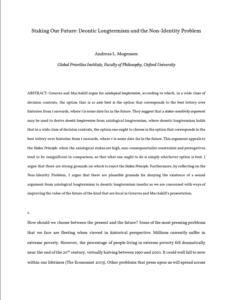Staking our future: deontic long-termism and the non-identity problem
Andreas Mogensen (Global Priorities Institute, Oxford University)
GPI Working Paper - No. 9-2019
Greaves and MacAskill argue for axiological longtermism, according to which, in a wide class of decision contexts, the option that is ex ante best is the option that corresponds to the best lottery over histories from t onwards, where t is some date far in the future. They suggest that a stakes-sensitivity argument may be used to derive deontic longtermism from axiological longtermism, where deontic longtermism holds that in a wide class of decision contexts, the option one ought to choose is the option that corresponds to the best lottery over histories from t onwards, where t is some date far in the future. This argument appeals to the Stakes Principle: when the axiological stakes are high, non-consequentialist constraints and prerogatives tend to be insignificant in comparison, so that what one ought to do is simply whichever option is best. I argue that there are strong grounds on which to reject the Stakes Principle. Furthermore, by reflecting on the Non-Identity Problem, I argue that there are plausible grounds for denying the existence of a sound argument from axiological longtermism to deontic longtermism insofar as we are concerned with ways of improving the value of the future of the kind that are focal in Greaves and MacAskill’s presentation.
Other papers
It Only Takes One: The Psychology of Unilateral Decisions – Joshua Lewis (New York University) et al.
Sometimes, one decision can guarantee that a risky event will happen. For instance, it only took one team of researchers to synthesize and publish the horsepox genome, thus imposing its publication even though other researchers might have refrained for biosecurity reasons. We examine cases where everybody who can impose a given event has the same goal but different information about whether the event furthers that goal. …
Doomsday rings twice – Andreas Mogensen (Global Priorities Institute, Oxford University)
This paper considers the argument according to which, because we should regard it as a priori very unlikely that we are among the most important people who will ever exist, we should increase our confidence that the human species will not persist beyond the current historical era, which seems to represent…
Measuring AI-Driven Risk with Stock Prices – Susana Campos-Martins (Global Priorities Institute, University of Oxford)
We propose an empirical approach to identify and measure AI-driven shocks based on the co-movements of relevant financial asset prices. For that purpose, we first calculate the common volatility of the share prices of major US AI-relevant companies. Then we isolate the events that shake this industry only from those that shake all sectors of economic activity at the same time. For the sample analysed, AI shocks are identified when there are announcements about (mergers and) acquisitions in the AI industry, launching of…

